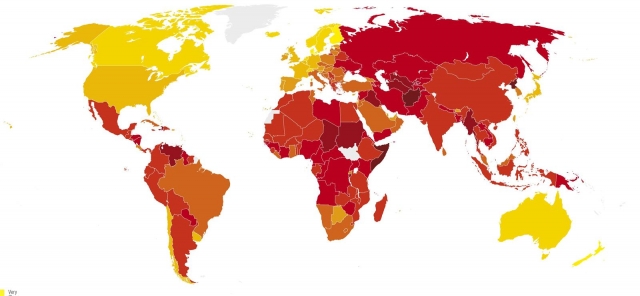Anastasia Balezdrova
This year, the country takes the 94th place among 176 countries, along with seven other countries none of which is an EU member.
"Over the past two years, I have given hundreds of interviews for media from around the world. All of them are asking about the pensions of the dead, the bogus blindman on the island of Zakynthos, the lawyers from Kolonaki, the "resistance" of shopkeepers in Hydra, the unpunished public workers, who make violations and lately, about the "Lagarde list." These are the things that have led to today's result," said the president of the Greek branch of the international organization" Transparency International," Costas Bakouris.
He said that several years ago, the Greek governments were taking only sporadic actions against corruption. "They failed because they were incomplete and mostly because there was no political will to fight corruption. The interests of some of the politicians and various guilds did not allow far-reaching measures to be taken. I would add that the biggest obstacle was the lack of political will."

According to Costas Bakouris, Greece already has the necessary "tools". "The majority of them are included in the new bailout agreement. In cooperation with the Task force, we have developed a roadmap against corruption and the National Coordinator will supervise all activities. Unfortunately, there is still opposition from various circles. But if the measures are implemented strictly, I believe that the results next year will be better. "
As he points out, there is an improved trend against corruption in society which is shared by 22% of Greeks. "However, we cannot say that these people deliberately choose to be against corruption," added Costas Bakouris. It is possible that some of them may have expressed this opinion because they probably do not already avail the financial resources to pay bribes and thus to provide themselves with fast and efficient services from public institutions.
According to him, the crisis in Greece is not the main cause of the increase in corruption. "In order for this to happen, there are two more prerequisites in addition to financial pressure: the presence of opportunities for corruption, of which we have plenty, and the lack of resistance from the public."
In this sense, he added that the proverbial delay in administering justice has a very negative impact. "When a citizen sees lawsuits dragging on for years, he could certainly resort much more easily to corrupt practices."
Costas Bakouris stresses that one of the most important steps in the fight against corruption is for the institutions in Greece to restore the confidence of society. "Political parties and lawmakers must initiate this. Our proposals in this direction are:
- Uploading the tax returns of lawmakers on the Internet and they must contain information about the financial situation from their entry into politics to today
- Changing the way of control over the finances of political parties
- Drawing up a code of ethics for lawmakers and
- Voting a law on the functioning of political parties."
The study of the international corruption perceptions index is published annually and reflects the perceptions of the level of corruption according to experts, analysts, scholars and business representatives in the respective countries.